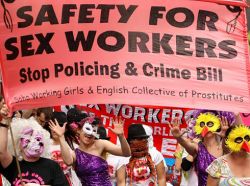It was okay to advertise sexual services. It was okay to see someone and have sex for money. But it was not okay to have sex for money in the same place more than one time. You couldn’t get rides there from somebody else who you trust. You couldn’t share a space with somebody else. If you are going to discuss the conditions of the engagement, you had to do so out of public eye or hearing, so you would have to move somewhere else.
As an assaulted women’s counselor, the first thing I would advise a woman who thinks she may be sexually assaulted is do not let your attacker move you to another location. So the law was prohibiting a basic safety measure.
The case of serial killer Willie Pickton in British Columbia is a good example. Sixty percent of the bodies found on Pickton’s pig farm were Aboriginal women. Their families needed to protest outside of police stations in order to get the police to look for their lost mothers, sisters, aunties, daughters.
The police said, “Well, they have a high risk life style, they probably moved on, or maybe they’ve overdosed somewhere.” You know – a whole bunch of scenarios that didn’t include a serial killer that targeted marginalized women.
I’m not sure if many people know this, but Paul Bernardo and his father were on the bad date list of sex workers here in Toronto years before the death of Kristen French came to light in 1992.
I’m not a lawyer, I’m a grassroots activist. But I’ve learned as much as I could about the law as it pertains to women I work with. And I learned that it was legal to work as a sex worker, but it was criminalized to keep safe.
So we sought the decriminalization of sex work, which would mean that all laws pertaining to sex work would be removed from the criminal code, while recognizing the various laws that can protect the safety of sex workers. If someone is going to kidnap you, we still have a kidnap law. If someone assaults you, they can be charged with assault. If someone tries to kill you, there are laws to punish murder. If someone tries to extort money, we have laws against this too.
This was the case made in court by Terri-Jean Bedford and Valerie Scott with their lawyer Alan Young, supported by grassroots activists. In 2010, the Ontario Superior Court ruled that existing prostitution laws were unjust and endangered the lives of sex workers. The Ontario government appealed.
Finally on March 26, 2012, Ontario’s Court of Appeal ruled that existing laws were preventing sex workers from properly protecting themselves. This decision means that workers will be able to hire bodyguards and other staff, and work indoors in legal brothels.
However, communicating in public for the purposes of prostitution will still be illegal. So women interacting and working as sex workers in the streets can still be arrested can still be held in custody. In my experience, it’s Aboriginal sex workers that are most likely to be arrested, and least likely to get bail. They are least likely to get lighter measures in terms of sentencing. This won’t change with the new legal reform.
Criminalize the Clients?
There are members of our community that are advocating for the Swedish model. That’s where it would be legal to sell sex, but the clients are criminalized. The problem with this is that still keeps police officers in the lives of Aboriginal sex workers.
We know that if you are an Aboriginal woman, you are four or five times more likely to die as a result of violence, you are racially profiled by police, least likely to get bail. Even under the Swedish model they could still charge you with a whole host of other charges and squeeze you for information about your clients.
So it would not reduce the level of violence or amount of incarceration for women if we advocate for the Swedish model. As Allan Young puts it, it doesn’t make sense to criminalize the purchase of something that’s legal to sell.
So we are still pursuing the complete decriminalization of sex work. It’s not for any of us to judge how someone earns their money.
I worked with Maggie’s: The Toronto Sex Workers Action Project for the last year and a half. Maggie’s is an organization run for and by local sex workers. We are coordinating a project, the first of its kind in Canada, to reach out to our women and take them out of isolation, so they can talk about safe practices in their work.
Some of our women don’t consider themselves sex workers. They’re hustling. They need to make rent. They need to buy Christmas presents for the kids. They need to put food on the table. There is still a big stigma in our community to talk about sex, let alone sex for money, let alone acknowledging that or being open to saying, “Yes, I’m a sex worker.” Decriminalizing sex work will go a long way toward helping those women be safe in their jobs.
Maurganne Mooney is of Cree and Anishinaabe ancestry living in Toronto. She is a front line worker in shelters for battered women, and a long time activist for sex worker rights.
The presentation on which this article is based can be viewed on Youtube.The complete webcast from the panel on The Criminalization of Indigenous People at Indigenous Sovereignty Week 2011 can be found here.


